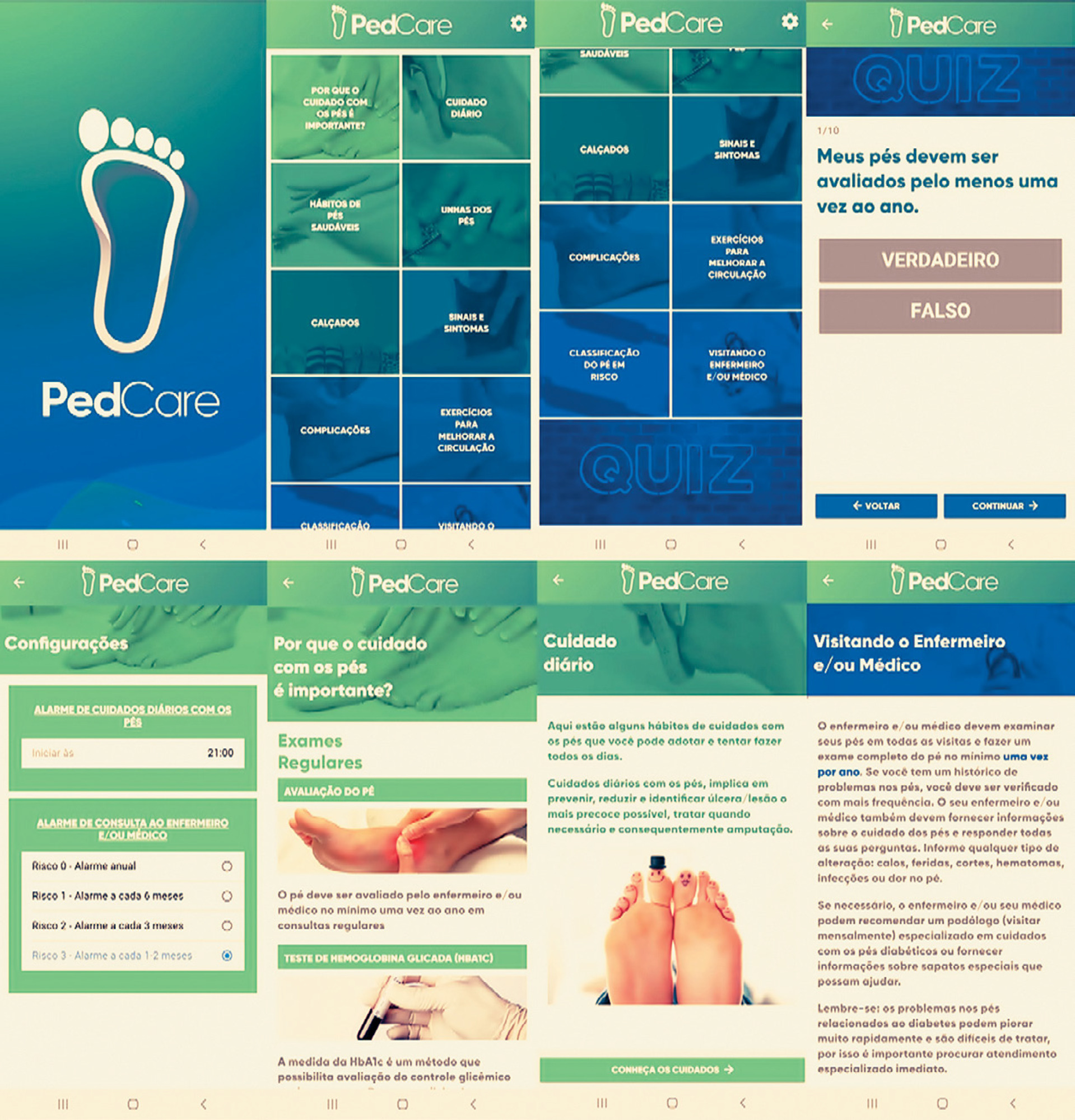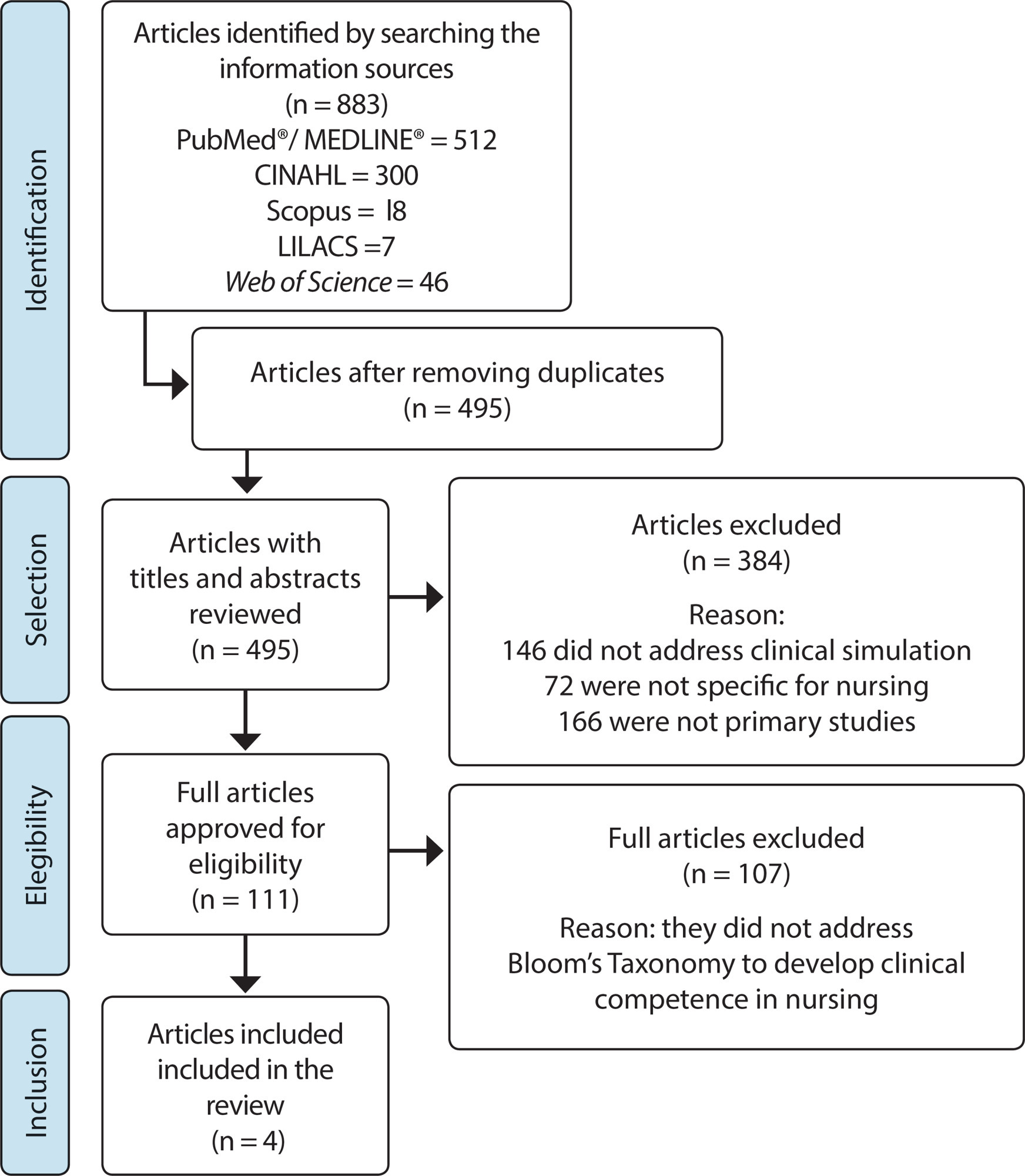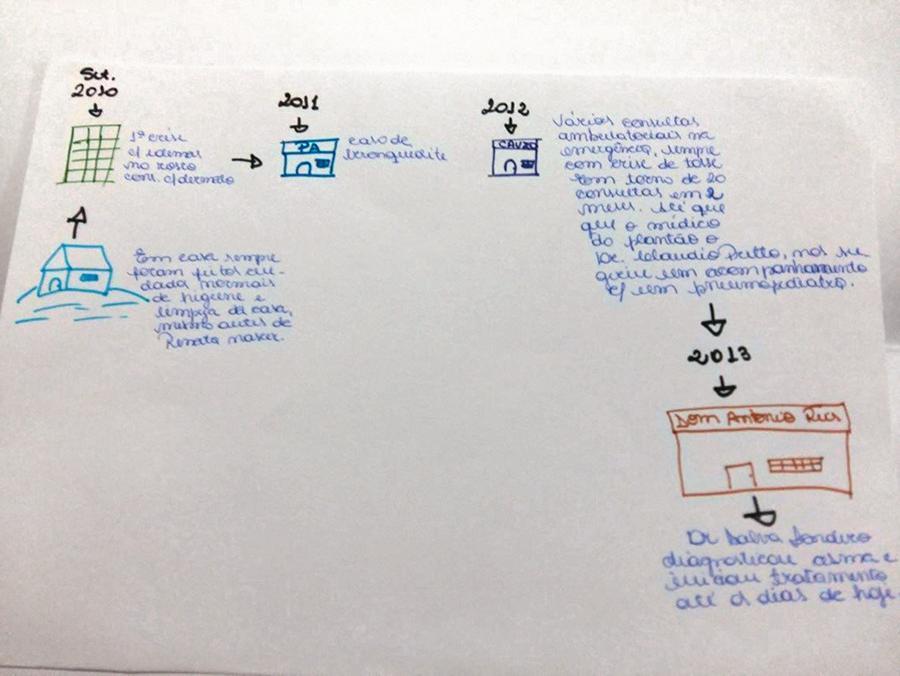-
RESEARCH01-01-2018
Spiritual needs experienced by the patient’s family caregiver under Oncology palliative care
Revista Brasileira de Enfermagem. 2018;71:2635-2642
Abstract
RESEARCHSpiritual needs experienced by the patient’s family caregiver under Oncology palliative care
Revista Brasileira de Enfermagem. 2018;71:2635-2642
DOI 10.1590/0034-7167-2017-0873
Views0See moreABSTRACT
Objective:
To understand the spiritual needs of the patients’ family caregiver under Oncology palliative care.
Method:
A descriptive, qualitative study with 20 family caregivers of patients hospitalized in an Oncology palliative unit. The data were collected through a phenomenological interview, and analyzed by the method of Amadeo Giorgi supported in the Merleau-Ponty’s Phenomenology of Perception.
Results:
The categories were unveiled: “Spirituality as a foundation for life”; “Spiritual needs sublimated by the family caregiver”; and “Care expected by the nurse”.
Conclusion:
Family caregivers appropriate spirituality as a coping strategy and meeting the purpose and meaning of the moment experienced. It is profitable for the nurse to contemplate the spiritual needs of the caregiver in order to provide a guided assistance in the humanization of care and comprehensive care. Therefore, there is a need for new studies that address this dimension to the family caregiver in the field of Oncology, since this care is incipient by the nurse.
-
RESEARCH01-01-2018
Being caregiver of people with Parkinson’s Disease: experienced situations
Revista Brasileira de Enfermagem. 2018;71:2628-2634
Abstract
RESEARCHBeing caregiver of people with Parkinson’s Disease: experienced situations
Revista Brasileira de Enfermagem. 2018;71:2628-2634
DOI 10.1590/0034-7167-2017-0008
Views0See moreABSTRACT
Objective:
To understand the experience of caring for a person with Parkinson’s Disease.
Method:
We used the qualitative study and thematic analysis with family caregivers of people with Parkinson’s Disease.
Results:
Three thematic categories were identified, being: Feelings related to Parkinson’s Disease; Changes in family daily routines; Caregiver strategies for self-care.
Final considerations:
Family care has shown the need for health services to provide caregivers support, as they experience situations of overload in care that can contribute to their illness. The findings also allow nurses to see the need for differentiated care for caregivers that, by assisting them with their needs, favor the quality of life of the caregiver, reduce the possibility of illness, allowing a more efficient care to the entity with chronic illness.
-
RESEARCH01-01-2018
Humanized practices of obstetric nurses: contributions in maternal welfare
Revista Brasileira de Enfermagem. 2018;71:2620-2627
Abstract
RESEARCHHumanized practices of obstetric nurses: contributions in maternal welfare
Revista Brasileira de Enfermagem. 2018;71:2620-2627
DOI 10.1590/0034-7167-2017-0290
Views0See moreABSTRACT
Objective:
To analyze the practice of obstetric nurses operating in a prenatal/delivery/postpartum unit of a university hospital in Mato Grosso and the maternal welfare resulted from the care provided in this scenario.
Method:
Study with a quantitative approach, carried out in a prenatal/delivery/postpartum unit of a university hospital in Cuiabá, Mato Grosso. The data were collected through the Scale of Maternal Welfare in Delivery Situation 2, and the study included 104 recent mothers in the period from June to September 2016. The data were analyzed in Epi Info version 7.
Results:
The results indicate that the practice of obstetric nurses is based on the humanization of labor and childbirth, however, the presence of invasive and unnecessary practices in the service did not influence the level of maternal welfare, which was optimum for 76% of the women.
Conclusion:
The lack of information might make the women less critical and, therefore, influence the evaluation of the care received
-
RESEARCH01-01-2018
Care coordination in Health Care for the child/adolescent in chronic condition
Revista Brasileira de Enfermagem. 2018;71:2612-2619
Abstract
RESEARCHCare coordination in Health Care for the child/adolescent in chronic condition
Revista Brasileira de Enfermagem. 2018;71:2612-2619
DOI 10.1590/0034-7167-2017-0787
Views0See moreABSTRACT
Objective:
To analyze the care coordination for the child and adolescent in chronic condition and users planning in the Health Care Network.
Method:
Qualitative study, conducted with 26 health professionals and managers through Focus Groups. Thematic content analysis was used.
Results:
Care coordination is fragile, with lack of support from the management, and presence of high turnover of managers and professionals. The limits in the network planning are due to frequent changes in the careflow. Communication between levels of care and lack of counter-referral makes network care unfeasible.
Final considerations:
There is a need for planning in the Health Care Network and establishment of careflow, as well as the construction of communication channels and tools of referral and counter-referral between professionals and services, for the constitution and integration of the network from the perspective of user-centered care.
-
RESEARCH01-01-2018
Influence of socio-demographic characteristics in the self-care of people with heart failure
Revista Brasileira de Enfermagem. 2018;71:2604-2611
Abstract
RESEARCHInfluence of socio-demographic characteristics in the self-care of people with heart failure
Revista Brasileira de Enfermagem. 2018;71:2604-2611
DOI 10.1590/0034-7167-2017-0480
Views1See moreABSTRACT
Objective:
To determine the influence of socio-demographic characteristics in the self-care of people with heart failure (HF).
Method:
Cross-sectional, analytical study, held in three private hospitals in Fortaleza, Ceará, Brasil, with 57 hospitalized patients. The data were collected through a demographic characterization form and a self-care assessment scale and were analyzed with inferential statistics, using mean comparison tests.
Results:
Self-care was best assessed in people with higher education level, higher household income and in a relationship.
Conclusion:
The socio-demographic characteristics influenced seven self-care practices: dietary control; monitoring of body weight; effort in labor activities; knowledge about HF; up-to-date vaccination record; leisure activities; and family and social support network with strong bonds. The higher prevalence of answers indicating satisfactory self-care practices among the patients occurred in the areas of health promotion and tolerance to stress.
-
01-01-2018
Ethical dilemmas for the areas of Nursing and Health in relation to Preprints
Revista Brasileira de Enfermagem. 2018;71:2602-2603
Abstract
Ethical dilemmas for the areas of Nursing and Health in relation to Preprints
Revista Brasileira de Enfermagem. 2018;71:2602-2603
DOI 10.1590/0034-7167.201871supl601
Views0According to a recent publication by a group of researchers at the National Institutes of Health and the Whitehead Institute(), a preprint submission is defined as a complete written description of a scientific work that has not yet been published in a journal. It may be a research article, an editorial, a review, or another […]See more -
01-01-2018
Dilemas éticos para área da Enfermagem e da Saúde em relação ao Preprint
Revista Brasileira de Enfermagem. 2018;71:2602-2603
Abstract
Dilemas éticos para área da Enfermagem e da Saúde em relação ao Preprint
Revista Brasileira de Enfermagem. 2018;71:2602-2603
DOI 10.1590/0034-7167.201871supl601
Views0De acordo com uma recente publicação de um grupo de pesquisadores do National Institutes of Health e do Whitehead Institute(), uma submissão preprint é definida como uma descrição escrita completa de um trabalho científico que ainda não foi publicado em um periódico. Pode ser um artigo de pesquisa, editorial, revisão ou outro tipo de documento […]See more -
ERRATUM01-01-2018
ERRATUM
Revista Brasileira de Enfermagem. 2018;71:2349-2350
Abstract
ERRATUMERRATUM
Revista Brasileira de Enfermagem. 2018;71:2349-2350
DOI 10.1590/0034-7167.201871suppl5e02
Views0Article “Integrative review of literature: nursing care to aged people with HIV”, with number of DOI: http://dx.doi.org/10.1590/0034-7167-2017-0264, published in the journal Revista Brasileira de Enfermagem, v71(suppl 2):884-82:References 28 and 30 should be deleted.[…]See more
-
REVIEW06-01-2020
Access of the black population to health services: integrative review
Revista Brasileira de Enfermagem. 2020;73(4):e20180834
Abstract
REVIEWAccess of the black population to health services: integrative review
Revista Brasileira de Enfermagem. 2020;73(4):e20180834
DOI 10.1590/0034-7167-2018-0834
Views1See moreABSTRACT
Objectives:
demonstrate and discuss how the black population’s access to health services occurs
Methods:
integrative literature review with the following question: How does the black population’s access to health services occur? The search was carried out in the Scholar, LILACS and SciELO databases and used the descriptor “access to health services” and the term “population,” resulting in a sample with twelve articles.
Results:
studies show that the difficulty of access is a fundamental factor for the quality of life of people, directly compromising preventive services, especially for women’s health and, in addition, it has significant impact on the illness process of the black population within its particularities.
Final Considerations:
several limiting factors compromise the black population’s access to health services, including institutional and structural factors

-
REVIEW11-06-2020
Transitional care to caregivers of dependent older people: an integrative literature review
Revista Brasileira de Enfermagem. 2020;73:e20200394
Abstract
REVIEWTransitional care to caregivers of dependent older people: an integrative literature review
Revista Brasileira de Enfermagem. 2020;73:e20200394
DOI 10.1590/0034-7167-2020-0394
Views1See moreABSTRACT
Objective:
To identify the needs of caregivers of dependent older people related to self-care in the transition from hospital to home.
Methods:
Integrative literature review that followed a predefined protocol, carried out from March to May 2019 in the platforms EBSCO, B-On, Scopus, Web of Science, and Joanna Briggs Institute. Descriptors and eligibility criteria were defined for the bibliographic sample, which was ten articles. The search was limited to articles published between 2015 and 2019 to guarantee evidence topicality.
Results:
The needs of caregivers related to transitional care can be grouped into five categories: needs in the transition into the role of caregiver; needs related to self-care of caregivers themselves; health needs; economic needs; and social and collective needs.
Final considerations:
The work developed by nurses regarding transitional care of caregivers must have two focuses: managing care provided to dependent older people and managing the needs of caregivers and the care offered to them.

-
REVIEW10-19-2020
Validation methods of nursing protocols: an integrative review
Revista Brasileira de Enfermagem. 2020;73:e20200050
Abstract
REVIEWValidation methods of nursing protocols: an integrative review
Revista Brasileira de Enfermagem. 2020;73:e20200050
DOI 10.1590/0034-7167-2020-0050
Views0See moreABSTRACT
Objective:
to identify scientific production about validation methods of nursing care protocols.
Method:
an integrative review with search at Scielo, Pubmed/MEDLINE, Virtual Health Library, Web of Science, Scopus, and EBSCOhost. The descriptors “validation studies”, “validation studies as topic”, “protocols”, “clinical protocols”, “practice guidelines as topic”, “nursing” and “nursing assessment” and the uncontrolled descriptor “validation” were used.
Results:
thirty-two articles were selected, most of them Brazilian. Content validation by experts was the most frequent method, with no consensus on the number of participants for the process. The collection instruments were mostly created by the authors. Data analysis was performed using descriptive statistics and Content Validity Index, with a variable consensus rate in the analyzed articles.
Conclusion:
protocols validated by experts are robust tools for use in clinical practice, with methodological rigor in development essential for its quality.

-
ORIGINAL ARTICLE05-24-2021
PEDCARE: validation of a mobile application on diabetic foot self-care
Revista Brasileira de Enfermagem. 2021;74:e20200856
Abstract
ORIGINAL ARTICLEPEDCARE: validation of a mobile application on diabetic foot self-care
Revista Brasileira de Enfermagem. 2021;74:e20200856
DOI 10.1590/0034-7167-2020-0856
Views0See moreABSTRACT
Objective:
to describe the process of validating a multimedia application on a mobile platform to promote foot care for people with diabetes.
Method:
a technological production and methodological type study. Content and appearance were validated by 39 judges (29 nursing judges and ten information and communication technology judges and 15 people from the target audience).
Results:
nursing judges made it possible to validate the material with a total Content Validity Index of 0.95, a non-significant binomial test for most items and Cronbach’s alpha of 0.92, information and communication technology judges with Suitability Assessment of Materials of 99.2% and the target audience with an agreement index of 98%.
Conclusion:
the application proved to be valid and reliable for use in clinical practice as an educational technology to promote foot care for people with diabetes.

-
EXPERIENCE REPORT04-09-2020
Implementation of an Artificial Intelligence Algorithm for sepsis detection
Revista Brasileira de Enfermagem. 2020;73(3):e20180421
Abstract
EXPERIENCE REPORTImplementation of an Artificial Intelligence Algorithm for sepsis detection
Revista Brasileira de Enfermagem. 2020;73(3):e20180421
DOI 10.1590/0034-7167-2018-0421
Views0See moreABSTRACT
Objectives:
to present the nurses’ experience with technological tools to support the early identification of sepsis.
Methods:
experience report before and after the implementation of artificial intelligence algorithms in the clinical practice of a philanthropic hospital, in the first half of 2018.
Results:
describe the motivation for the creation and use of the algorithm; the role of the nurse in the development and implementation of this technology and its effects on the nursing work process.
Final Considerations:
technological innovations need to contribute to the improvement of professional practices in health. Thus, nurses must recognize their role in all stages of this process, in order to guarantee safe, effective and patient-centered care. In the case presented, the participation of the nurses in the technology incorporation process enables a rapid decision-making in the early identification of sepsis.
-
REVIEW03-24-2021
Development of clinical competence in nursing in simulation: the perspective of Bloom’s taxonomy
Revista Brasileira de Enfermagem. 2021;74(1):e20200135
Abstract
REVIEWDevelopment of clinical competence in nursing in simulation: the perspective of Bloom’s taxonomy
Revista Brasileira de Enfermagem. 2021;74(1):e20200135
DOI 10.1590/0034-7167-2020-0135
Views0See moreABSTRACT
Objectives:
to investigate the scientific evidence on the use of Bloom’s taxonomy for developing competence in nursing professionals and students in clinical simulation.
Methods:
integrative review of the National Library of Medicine (NLM), National Institutes of Health (NIH), Cumulative Index to Nursing and Allied Health Literature (CINAHL), Latin American and Caribbean Literature in Health Sciences (LILACS), Web of Science and SCOPUS databases, using the Rayyan application.
Results:
a total of 871 studies were identified; four composed the sample. The development of clinical competence occurred through the coordination of knowledge, skills, and attitudes. To develop the cognitive domain, the objectives of knowledge and comprehension of the Bloom’s taxonomy were mobilized. The psychomotor domain required development of the skills demanded by the proposed clinical care. The affective domain was developed through will and motivation to learn.
Conclusions:
it is possible to develop clinical competence in nursing by adopting Bloom’s taxonomy in each phase of clinical simulation.

-
03-27-2020
Coronavirus 2020
Revista Brasileira de Enfermagem. 2020;73(2):e2020n2
Abstract
Coronavirus 2020
Revista Brasileira de Enfermagem. 2020;73(2):e2020n2
DOI 10.1590/0034-7167-2020730201
Views0Emerging and reemerging infectious diseases are constant challenges for public health worldwide. Recent cases of pneumonia of unknown cause in Wuhan, China, have led to the discovery of a new type of Coronavirus (2019-nCoV), which are enveloped RNA viruses, commonly found in humans, other mammals and birds, capable of causing respiratory, enteric, hepatic, and neurological […]See more -
ORIGINAL ARTICLE12-13-2019
Accessibility of children with special health needs to the health care network
Revista Brasileira de Enfermagem. 2019;72:65-71
Abstract
ORIGINAL ARTICLEAccessibility of children with special health needs to the health care network
Revista Brasileira de Enfermagem. 2019;72:65-71
DOI 10.1590/0034-7167-2017-0899
Views0See moreABSTRACT
Objective:
To know how children with special health needs access the health care network.
Method:
This is a qualitative research of descriptive-exploratory type, developed using semi-structured interviews mediated by the Talking Map design. Participants were 19 family caregivers of these children in two Brazilian municipalities. Data were submitted to inductive thematic analysis.
Results:
Difficulties were mentioned from the diagnosis moment to the specialized follow-up, something represented by the itinerary of the c hild and his/her family in the search for the definition of the medical diagnosis and the access to a specialized professional; a gap between the children’s needs and the care offered was observed in primary health care.
Conclusion:
The access of children with special health needs is filled with obstacles such as slowness in the process of defining the child’s diagnosis and referral to a specialist. Primary health care services were replaced by care in emergency care units.

Search
Search in:
Nuvem de Tags
Enfermagem (930)Cuidados de Enfermagem (269)Atenção Primária à Saúde (239)Idoso (208)Educação em Enfermagem (151)Segurança do Paciente (150)Saúde Mental (145)Educação em Saúde (139)Estudos de Validação (131)Qualidade de Vida (104)Tecnologia Educacional (100)Promoção da Saúde (99)COVID-19 (91)Criança (91)Família (87)Enfermagem Pediátrica (86)Saúde do Trabalhador (86)Adolescente (85)Saúde Pública (82)Estudantes de Enfermagem (77)



